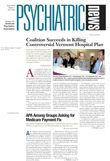A career in academic psychiatry is a professional option for all psychiatrists. This career track is competitive, and an early start is necessary to ensure a fair chance at competing in the promotion process. However, many residents don’t know the types of accomplishments and skills a department chair or dean of faculty are looking for in candidates. In December 2001, I had the opportunity to attend the Early Career Women Faculty Professional Development Seminar organized by the Association of American Medical Colleges (AAMC), and it was clear that many of us knew little about the structure and culture of the academic world. This seminar, playfully dubbed by some “mentor replacement therapy,” is offered to women in their first years as medical faculty.
Academic medicine has historically been the domain of men, and knowledge about achieving promotions and tenure in this system typically has been passed down from senior to junior faculty through mentoring. Women physicians have been at a disadvantage due to a relative lack of women role models. Residency training programs might not provide this information through didactics on the academic career-building process. In the absence of specific teaching in residency regarding this particular career path, and without a wide variety of women senior faculty to act as mentors, the AAMC has provided an excellent adjunct to this important educational process.
The seminar offerings covered three basic areas of skill development, career-building strategies, and the culture of academia. Certain skills can make the negotiations required to achieve promotion possible. The workshops on conflict management and negotiation skills provided pointers on working with people at all levels of the hierarchy. Our interpersonal interactions are often our most valuable career-building currency, and the seminar increased our consciousness of these dynamics with an interactive workshop on working with different personality types. The inner workings of the publication industry were revealed, as were the ins and outs of grant writing.
Of particular interest was the information given regarding the social and political structure of academic institutions. The culture of academic medicine is to some extent shrouded in secrecy, and we need to know the right questions to ask as we attempt to enter into and progress in the system. The seminar organizers stated how surprised they are, year after year, that conference goers often don’t know the specific requirements for promotion in their institutions. Other workshops provided information regarding the financial resources within academic departments and an understanding of how such knowledge can create a savvy academic physician who plans realistically for projects and takes full advantage of resources available.
All of this was pulled together in lectures and workshops on career-building strategies. It cannot be emphasized too strongly the value of starting career building early, in residency. Seminar organizers advised taking time to think about one’s career goals and making a five-year plan to achieve them. If this is done in residency, it is far more likely that the first job after residency will be part of strategy that will result in the career that best reflects the psychiatrist’s interests and abilities.
After the goals are established, with a corresponding timeline, a detailed curriculum vitae (CV) should be compiled, and, if relevant, a teaching portfolio. Seminar faculty provided individualized reviews of participants’ CVs, and many people were surprised at how conservative they were in listing their accomplishments. Residency training programs can help improve the success of their graduates by providing information on all that can and should be included in this important career document.
Through this excellent array of workshops, presented by professionals who are tops in their fields and astutely combined with opportunities for reflection and dialogue, the AAMC has truly provided a means to even the playing field for women entering academic medicine. It is hoped that as more women enter faculty positions and achieve tenure, the road to these advanced positions will become friendlier and less confusing to traverse. Likewise, the academy itself might make a contribution to this by working to eliminate some of the mystery about the academic process of advancement and promotions. Requirements for promotion and tenure can be provided more readily to early career faculty who don’t always know the right questions to ask. Finally, residency training programs can provide earlier and more elaborate career advising. Until these changes fully occur, the AAMC provides this seminar once a year for early career women faculty. For those who don’t want to wait until after graduation, the AAMC produces books, periodicals, and other resources to promote the development of careers in medicine for both men and women.
Remember, it’s never too early to decide on your career goals and start working toward them. The resources are out there; it is up to you to use them. ▪
